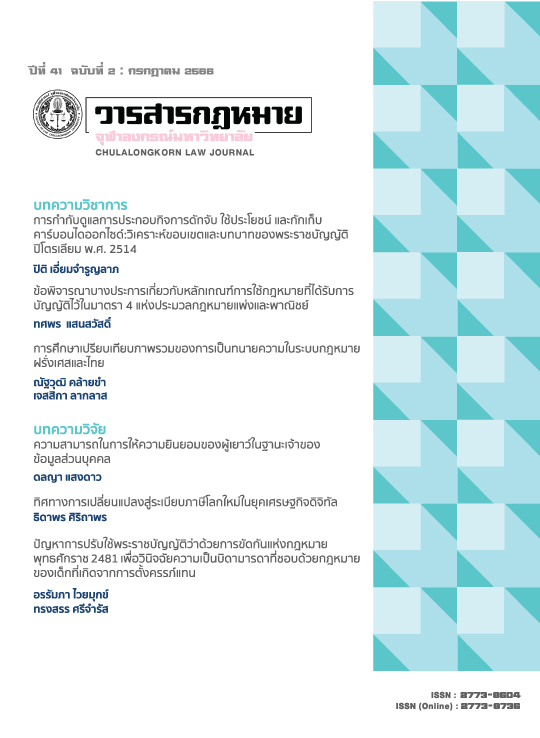ปัญหาการปรับใช้พระราชบัญญัติว่าด้วยการขัดกันแห่งกฎหมาย พุทธศักราช 2481 เพื่อวินิจฉัยความเป็นบิดามารดาที่ชอบด้วยกฎหมายของเด็กที่เกิดจากการตั้งครรภ์แทน
Main Article Content
บทคัดย่อ
การวิจัยนี้มุ่งศึกษาสภาพปัญหาทางกฎหมายที่เกิดขึ้นกรณีมีข้อพิพาทในศาลไทยเกี่ยวกับความเป็นบิดามารดาที่ชอบด้วยกฎหมายของเด็กที่เกิดจากการตั้งครรภ์แทนในกรณีข้อเท็จจริงมีองค์ประกอบต่างประเทศเข้ามาเกี่ยวข้อง
จากการศึกษาพบว่า ในขณะที่กฎหมายสารบัญญัติไทยในปัจจุบันบัญญัติไว้อย่างชัดเจนให้คู่สมรสที่ประสงค์จะมีบุตรเป็นบิดามารดาที่ชอบด้วยกฎหมายของเด็กที่เกิดจากการตั้งครรภ์แทน แต่ในกรณีที่มีการปรับใช้พระราชบัญญัติว่าด้วยการขัดกันแห่งกฎหมาย พุทธศักราช 2481 อาจนำไปสู่การใช้กฎหมายสารบัญญัติต่างประเทศที่ไม่รับรองความเป็นบิดามารดาที่ชอบด้วยกฎหมายของบุคคลดังกล่าวถึงแม้จะเป็นการตั้งครรภ์แทนที่ชอบด้วยกฎหมายในประเทศไทยก็ตาม เพื่อบรรเทาผลดังกล่าว การศึกษานี้มีข้อเสนอแนะว่าควรนำกลไกต่าง ๆ ของหลักกฎหมายขัดกัน เช่น การย้อนส่งหรือหลักความสงบเรียบร้อยฯ ในทางระหว่างประเทศมาปรับใช้เพื่อจำกัดผลของการใช้กฎหมายต่างประเทศนั้นในศาลไทย และควรแก้ไขเพิ่มเติมกฎเกณฑ์ว่าด้วยการขัดกันแห่งกฎหมายให้มีบทบัญญัติเฉพาะสำหรับประเด็นการวินิจฉัยความเป็นบิดามารดาที่ชอบด้วยกฎหมายของเด็กที่เกิดจากการตั้งครรภ์แทน
Article Details

อนุญาตภายใต้เงื่อนไข Creative Commons Attribution-NonCommercial-NoDerivatives 4.0 International License.
ลิขสิทธิ์และเนื้อหาในเว็บไซต์ของวารสารกฎหมาย (รวมถึง โดยไม่จำกัดเฉพาะ เนื้อหา รหัสคอมพิวเตอร์ งานศิลป์ ภาพถ่าย รูปภาพ ดนตรีกรรม โสตทัศนวัสดุ) เป็นกรรมสิทธิ์ของวารสารกฎหมาย และผู้ได้รับการโอนสิทธิทุกราย
1. วารสารกฎหมาย ให้อนุญาตให้คุณใช้สิทธิอันไม่เฉพาะเจาะจงที่สามารถถูกถอนเมื่อใดก็ได้ โดยไม่มีค่าใช้จ่าย ในการ
- เยี่ยมชมเว็บไซต์และเอกสารในเว็บไซต์นี้ จากคอมพิวเตอร์หรือเครื่องมือสื่อสารผ่านเว็บบราวเซอร์
- คัดลอกและจัดเก็บเว็บไซต์และเอกสารในเว็บไซต์นี้บนลงคอมพิวเตอร์ของคุณผ่านระบบความจำ cache
- สั่งพิมพ์เอกสารจากเว็บไซต์นี้สำหรับการใช้ส่วนตัวของคุณ
- ผลงานที่ได้รับการตีพิมพ์โดยวารสารกฎหมาย จุฬาลงกรณ์มหาวิทยาลัย ถูกคุ้มครองภายใต้ Creative Commons Attribution 4.0 International License ซึ่งอนุญาตให้ทุกคนสามารถคัดลอก แจกจ่าย ดัดแปลง ส่งต่อ ผลงานได้ ก็ต่อเมื่อผลงานและแหล่งข้อมูลได้รับการอ้างอิงอย่างเหมาะสม
2. วารสารกฎหมาย จุฬาลงกรณ์มหาวิทยาลัย สงวนสิทธิ์ไม่อนุญาตให้คุณใช้สิทธิอื่นใดที่เกี่ยวข้องกับเว็บไซต์และเอกสารบนเว็บไซต์นี้ เช่น การคัดลอก ดัดแปลง เปลี่ยนแปลง ส่งต่อ ตีพิมพ์ แจกจ่าย เผยแพร่ จัดแสดงในที่สาธารณะ ไม่ว่าจะในรูปแบบใดก็ตาม ซึ่งเว็บไซต์หรือเอกสารบนเว็บไซต์ โดยไม่อ้างอิงถึงแหล่งข้อมูลหรือโดยไม่ได้รับอนุญาตเป็นลายลักษณ์อักษรจากวารสารกฎหมาย จุฬาลงกรณ์มหาวิทยาลัย
3. คุณอาจขออนุญาตที่จะใช้เอกสารอันมีลิขสิทธิ์บนเว็บไซต์นี้โดยการเขียนอีเมลล์มายัง journal@law.chula.ac.th
4. วารสารกฎหมาย จุฬาลงกรณ์มหาวิทยาลัย เข้มงวดกับการคุ้มครองลิขสิทธิ์อย่างมาก หากวารสารกฎหมาย จุฬาลงกรณ์มหาวิทยาลัยพบว่าคุณได้ใช้เอกสารอันมีลิขสิทธิ์บนเว็บไซต์นี้โดยไม่ถูกต้องตามการอนุญาตให้ใช้สิทธิ ดังที่กล่าวไปข้างต้น วารสารกฎหมาย จุฬาลงกรณ์มหาวิทยาลัยอาจดำเนินคดีตามกฎหมายต่อคุณได้ เพื่อเรียกร้องค่าเสียหายที่เป็นตัวเงินและคำขอชั่วคราวให้คุณหยุดการใช้เอกสารดังกล่าว ทั้งนี้ คุณอาจถูกสั่งให้ชดใช้ค่าใช้จ่ายใดๆ ที่เกี่ยวข้องกับการดำเนินการตามกฎหมายนี้
หากคุณพบเห็นการใช้เอกสารอันมีลิขสิทธิ์ของวารสารกฎหมาย จุฬาลงกรณ์มหาวิทยาลัย ที่ขัดหรืออาจขัดต่อการอนุญาตให้ใช้สิทธิดังที่ได้กล่าวไปข้างต้น โดยเชื่อว่าได้ละเมิดลิขสิทธิ์ของคุณหรือของผู้อื่น สามารถร้องเรียนมาได้ที่ journal@law.chula.ac.th
เอกสารอ้างอิง
Anastasia Grammaticaki-Alexiou. Best Interests of the Child in Private International Law (Volume 412). Collected Courses of the Hague Academy of International Law. Brill, 2020.
Art. 46 of Loi portant le Code de droit international privé
Article 123 of Family Code of Ukraine
Article 51-4 of The Family Code of Russian Federation
Article 59 of Projet de Code de droit international privé
Artikel 19(1) of Einführungsgesetz zum Bürgerlichen Gesetzbuche (EGBGB)
Artikel 92-1 of Burgerlijk Wetboek
Audit. Le caractère fonctionnel de la règle de conflit (Volume 186)
Bernard Audit. Le caractère fonctionnel de la règle de conflit (Volume 186). Collected Courses of the Hague Academy of International Law. Brill, 1984.
Bürgerliches Gesetzbuch (BGB). § 1591 Mutterschaft. Mutter eines Kindes ist die Frau, die es geboren hat. [online] Available from: https://www.gesetze-im-internet.de/bgb/
Dominique Foussard, Marie-Laure Niboyet, and Cyril Nourissat. Réflexions méthodologiques sur le projet de code de droit international privé. Revue critique de droit international privé.
European Network on Statelessness. No Child Should be Stateless. European Network on Statelessness, 2015.
General Affairs and Policy. A study of legal parentage and the issues arising from international surrogacy arrangement. Hague Conference on Private International Law, 2014.
Grammaticaki-Alexiou. Best Interests of the Child in Private International Law (Volume 412)
Marc Fallon. La loi belge de droit international privé, pour un bicentenaire.Travaux du Comité français de droit international privé année 2004-2006.Paris: Editions Pedone, 2008.
Marie-Laure Niboyet and Géraud de Geouffre de La Pradelle. Droit international privé. 7e ed. Paris: LGDJ, 2020.
Nishitani. Identité culturelle en droit international privé de la famille (Volume 401).
Part 2-8 of South Australia’s Surrogacy Act 2019
Paul Torremans. Exclusion of Foreign Law. Chap. 8. Cheshire, North & Fawcett: Private International Law, eds. Paul Torremans et al. Oxford University Press, 2017.
Peter Hay, Patrick J. Borchers, and Symeon Symeonides. Conflict of laws. 5th ed. St. Paul, MN: West, 2010.
Pippa Rogerson. Collier's Conflict of Laws. 4th ed. Cambridge: Cambridge University Press, 2013.
Section 297 of Children’s Act 2005
Symeon C. Symeonides. Private International Law: Idealism, Pragmatism, Eclecticism General Course on Private International Law (Volume 384). Collected Courses of the Hague Academy of International Law. Brill, 2017.
The Surrogacy (Regulation) Act 2021.
Yuko Nishitani. Identité culturelle en droit international privé de la famille (Volume 401). Collected Courses of the Hague Academy of International Law. Brill, 2019.
Yvon Loussouarn, Pierre Bourel, and Pascal De Vareilles-Sommières. Droit international privé. 10e ed. Paris: Dalloz, 2013.
กิตติวัฒน์ จันทร์แจ่มใส. รายงานฉบับสมบูรณ์ การยกเลิกหลักการย้อนส่งในการขัดกันแห่งกฎหมาย : ความเป็นไปได้ในทางทฤษฎีและในทางปฏิบัติ. คณะกรรมการส่งเสริมงานวิจัย คณะนิติศาสตร์ มหาวิทยาลัยธรรมศาสตร์, 2559.
ข้อ 1-5 ประกาศสำนักทะเบียนกลาง เรื่อง หลักเกณฑ์ วิธีการและเงื่อนไขการแจ้งการเกิดของเด็กที่เกิดจากการตั้งครรภ์แทนโดยอาศัยเทคโนโลยีช่วยการเจริญพันธุ์ทางการแพทย์
ธานี วรภัทร์ และคณะ. รายงานผลการวิจัย เรื่อง ศึกษาและวิเคราะห์การบังคับใช้กฎหมายเทคโนโลยีช่วยการเจริญพันธุ์. มหาวิทยาลัยธุรกิจบัณฑิตย์, 2561.
ประกาศกระทรวงสาธารณสุขเรื่อง หลักเกณฑ์ วิธีการ และเงื่อนไขในการให้หญิงอื่นที่มิใช่ญาติสืบสายโลหิตของสามีหรือภริยาที่ชอบด้วยกฎหมายรับตั้งครรภ์แทน พ.ศ. 2558
ประสิทธิ์ ปิวาวัฒนพานิช. คำอธิบายกฎหมายระหว่างประเทศแผนกคดีบุคคล. กรุงเทพฯ: สำนักพิมพ์มหาวิทยาลัยธรรมศาสตร์, 2556.
พนิตสุภา สุดสงวน และคณะ. สิทธิการลาเพื่อเลี้ยงดูบุตรที่เกิดจากการตั้งครรภ์แทน. วารสารรัฐศาสตร์รอบรู้และสหวิทยาการ 5, 1 (มค.-ก.พ. 2565): 35.
พวงรัตน์ ปฐมสิริรักษ์. รายงานการวิจัย เรื่อง ปัญหาการกําหนดสัญชาติของเด็กที่เกิดจากการตั้งครรภ์แทนในประเทศไทย. คณะกรรมการส่งเสริมงานวิจัยคณะนิติศาสตร์ มหาวิทยาลัยธรรมศาสตร์, 2562.
ไพชยนต์ เจริญสุข และพินิจ ทิพย์มณี. การรับรองสิทธิของคู่สมรสที่มีความผิดปกติในเซลล์สืบพันธุ์ทั้งสองฝ่ายในการใช้เทคโนโลยีช่วยเจริญพันธุ์ทางการแพทย์.วารสารนิติศาสตร์และสังคมท้องถิ่น 4, 1 (ม.ค.-มิ.ย. 2563): 1-31.
มาตรา 21 พระราชบัญญัติคุ้มครองเด็กที่เกิดโดยอาศัยเทคโนโลยีช่วยการเจริญพันธุ์ทางการแพทย์ พ.ศ. 2558
มาตรา 22 พระราชบัญญัติคุ้มครองเด็กที่เกิดโดยอาศัยเทคโนโลยีช่วยการเจริญพันธุ์ทางการแพทย์ พ.ศ. 2558
มาตรา 29 พระราชบัญญัติคุ้มครองเด็กที่เกิดโดยอาศัยเทคโนโลยีช่วยการเจริญพันธุ์ทางการแพทย์ พ.ศ. 2558
มาตรา 30 พระราชบัญญัติว่าด้วยการขัดกันแห่งกฎหมาย พุทธศักราช 2481
มาตรา 44 วรรคแรก ประมวลกฎหมายแพ่งและพาณิชย์
ยศพนธ์ นิติรุจิโรจน์ และติณเมธ วงศ์ใหญ่. การใช้กฎหมายต่างประเทศในศาลไทย. จุลนิติ (ก.ค.-ส.ค. 2558): 73-89.
สายหยุด แสงอุทัย. การขัดกันแห่งกฎหมาย : หลักทั่วไปของกฎหมายระหว่างประเทศแผนกคดีบุคคลและคำอธิบายพระราชบัญญัติว่าด้วยการขัดกันแห่งกฎหมาย พุทธศักราช 2481 เรียงมาตรา. โรงพิมพ์สยามพณิชยการ, 2482.
หยุด แสงอุทัย. คำอธิบายกฎหมายระหว่างประเทศแผนกคดีบุคคล ว่าด้วยการขัดกันแห่งกฎหมาย กฎหมายสัญชาติ (แก้ไขเพิ่มเติมครั้งที่ 9 พ.ศ. 2516) พร้อมด้วยพระราชบัญญัติสัญชาติ (Nationality Act) พระราชบัญญัติว่าด้วยการขัดกันแห่งกฎหมาย (Act on Conflict of Laws). นิติบรรณการ, 2516.


